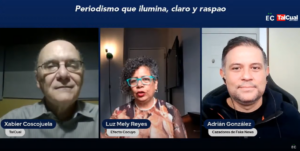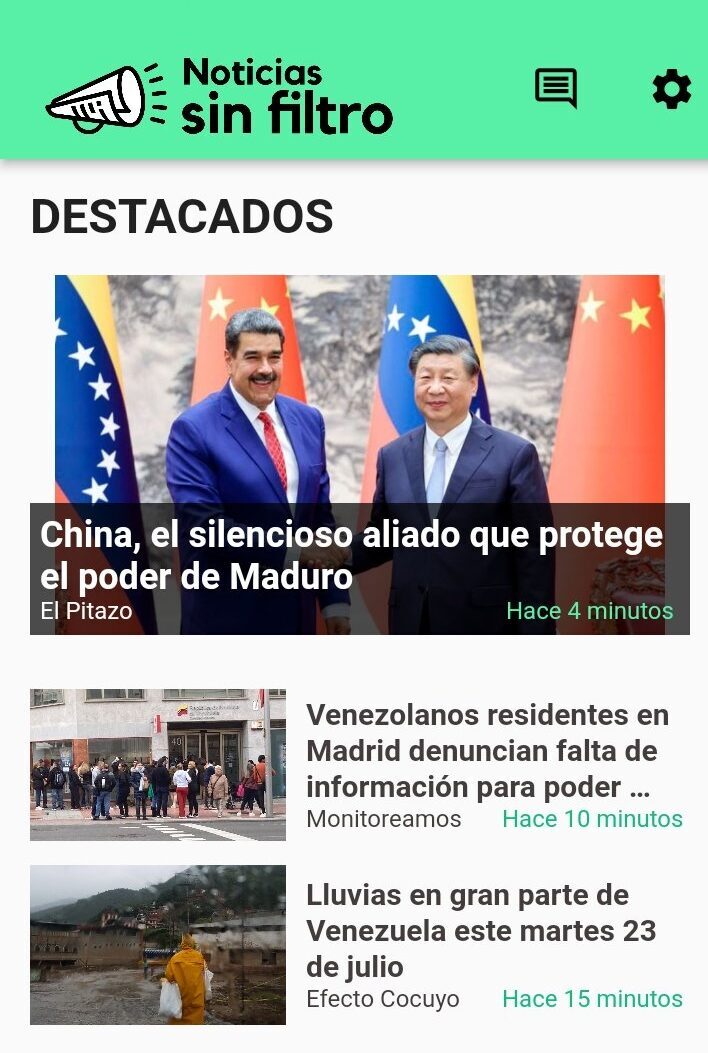Digital media outlet Efecto Cocuyo has prepared for the upcoming presidential elections in Venezuela for months.
Special features, interviews on YouTube with candidates and experts, a chatbot that helps fact-check viral content, courses on electoral coverage and disinformation. They’ve also formed 10 different alliances with media outlets inside and outside the country.
Now, just three days before an election that could bring drastic changes to the South American country, they’re ready.
"We are working to provide the best coverage and we are preparing for a day longer than 24 hours,” Luz Mely Reyes, director and co-founder of Efecto Cocuyo, told LatAm Journalism Review (LJR). “The announcement of the results may be complicated."
Presidential elections are being held in the country, and for the first time in 25 years, national and international media are talking about the possibility of a transition of government.
To prepare for the long day ahead, Venezuelan digital media outlets are turning to collaboration with colleagues inside and outside the country, as well as innovative technologies, to reach voters and to battle disinformation and restrictions on the press.

The Cazadores de Fake News team is collaborating with Efecto Cocuyo and other media outlets this election season with the intention of joining forces and ensuring that no false news goes unverified. (Photo: screenshot from Efecto Cocuyo's Youtube live stream).
“In the past, when there were large newsrooms, you didn't have to jump from one media outlet to another to get the full picture,” Carmen Riera, director of the independent digital media outlet Runrun.es, told LJR. “We digital native media are all very small. That is why we have to join forces, to give our best and have much more complete coverage.”
Fighting disinformation
Adrián González, director of Cazadores de Fake News (Fake News Hunters), said the amount of disinformation being spread around this election is unprecedented: “It is something extraordinary.”
“Every three or four hours a different hoax comes out that we must contain, dismantle or refute,” González told LJR.
A few days ago, Cazadores de Fake News reported the use of fake accounts publishing hateful content and posing as supporters of the opposition. According to their reporting, this network of accounts was linked to Venezuelan Minister of Communication Freddy Ñáñez.
As a result of that reporting, the organization reported a coordinated attempt to stigmatize its fact-checking. The attacks were executed through more than 20 fake accounts on X, and real profiles.
The Cazadores de Fake News team is collaborating with Efecto Cocuyo and other media outlets this election season with the intention of joining forces and ensuring that no false news goes unverified. The media outlets share fact-checks among themselves in order to cover the greatest amount of false news and in turn expand their audiences.
The work has not been without its challenges. The web domain of Cazadores de Fake News was blocked in the country on July 4, the day the electoral campaign for the presidential elections began, according to the Venezuelan organization for the defense of digital rights VE sin Filtro.
That, in part, motivated them to prioritize publications on social media instead of their website. In the days leading up to the election, the team decided to publish denunciations and denials of false news through social media, and only publish the most relevant information on the website.
“We want to respond more quickly, more expeditiously, and perhaps not as thoroughly as we normally do,” González said. “We want it to be timely because it is pointless to debunk a hoax two days later. It takes us about two hours to refute something."
Shielded from blocking
Cazadores de Fake News is not alone in being blocked in Venezuela.
Media outlets like Efecto Cocuyo, Tal Cual, El Estímulo, Runrun.es and Analítica are blocked by the main internet operators in the country, according to VE sin Filtro. Other fact-checking sites like Es Paja and the Venezuelan Fake News Observatory, as well as the websites of press freedom organizations Espacio Público and the Press and Society Institute and, even VE sin Filtro itself, are also blocked.
“This is a serious attack against civic space that compromises the conditions and guarantees to participate freely and informed in the elections,” VE sin Filtro has said.
The only way users can bypass blockings is through the use of VPNs (Virtual Private Networks), but using them can be complicated for some users.
This is why blocked independent media outlets are encouraging the download of Noticias Sin Filtro (Unfiltered News), a mobile application created by the organization Conexión Segura y Libre and launched at the end of June of this year.
Noticias Sin Filtro is developed on censorship evasion technologies, that is, it runs through VPNs. After downloading the app, users can access blocked sites without having to use a VPN directly.
Users of Noticias sin Filtro can even listen to some radio programs and podcasts affected by censorship as well.
“It is super easy to use, it does not require creating a username or having passwords. None of that,” Andres Azpurua, executive director of the organization Venezuela Inteligente, creator of the application, said in a promotional video. “In Noticias Sin Filtro, you can find the country's main independent media in one place, uncensored.”

Noticias Sin Filtro (Unfiltered News), a mobile application created by the organization Conexión Segura y Libre and launched at the end of June of this year. (Photo: screenshot)
Preventing a blackout
Despite collaboration within the country and technology that works around website blockings, journalists in Venezuela are concerned about a possible information blackout before, during and after elections.
Because of this, both national and international media alliances have joined together with the intention of reproducing real, timely and verified information, Riera, from Runrun.es, said.
Within the country Runrun.es will be working in alliance with the Venezuela Vota operation from El Pitazo. That project involves the participation of more than 70 independent journalists, 20 members of the New Journalists Training Program and 20 infocitizens of the media outlet distributed in 96 key municipalities of Venezuela.
Additionally, to give further visibility to news from outside the capital, Runrunes is collaborating with regional media including Diario La Nación of Táchira, Yaracuy al día, La Mañana of Falcón, El Impulso of Barquisimeto, El Tiempo of Puerto de la Cruz and Correo del Caroní of Ciudad Guayana.
On a regional level, there is the alliance La Hora de Venezuela, led by the Latin American journalistic platform Connectas. Media outlets from the region are participating, including El Espectador from Colombia, Aristegui Noticias from Mexico and La Prensa Gráfica from Panama, among others.
As part of this alliance, media outlets outside Venezuela are publishing their own stories and, at the same time, republishing information from Venezuelan media. These are shared on social media platforms using the hashtag #LaHoraDeVenezuela with the aim of expanding the reach of rigorous information about what is happening in the Venezuelan presidential campaigns.
“With this alliance we seek to ensure that these media are replicators in Latin America of the information that we are producing here,” Riera said. “If by chance an information blackout occurs, they could continue giving the information that we can’t.”